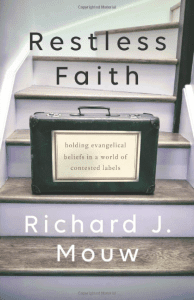 In his new book called Restless Faith, former Fuller Seminary president Richard Mouw dips into the question of labels and asks if we should call evangelicalism a “former movement.”
In his new book called Restless Faith, former Fuller Seminary president Richard Mouw dips into the question of labels and asks if we should call evangelicalism a “former movement.”
He’s unwilling to give up on the term. I find the term, at least in the USA, well-nigh useless today.
Is it?
I don’t want to come off as defensive about my own preference for holding on to the label. I think it is a healthy thing to argue about whether a label like “evangelical” has outlived its usefulness.
What about that well-known and highly-regarded Bebbington quadrilateral, which does have considerable overlap with many who’d not be called evangelical? Mouw nuances:
We have insisted on the need for a personal relationship to Christ in response to a more “nominal” form of Christianity—as well as over against a “many different roads to heaven’ relativism. We have proclaimed the supremacy of the Bible’s authority as over against those who allow churchly authority to “correct,” or to supplement in relativizing ways, the clear teachings of the Scriptures. The centrality of the work of the cross has been for us a nonnegotiable undergirding of the call to sinners to trust in Christ alone as the heaven-sent Savior. And our brand of activism has been our way of insisting that a genuine faith must take shape in the kind of holy living that requires us to bear witness to God’s revealed will for our daily lives.
He tells a story about “Amy”:
One consideration in deciding whether evangelical identity is worth preserving is our relationship to our younger generation. Take Amy—not her real name—a Fuller Seminary student. She was raised by evangelical parents who were active in a conservative congregation. Amy’s own faith was strengthened by her participation during high school in Young Life. She attended an evangelical college, where she embraced the idea of developing Christian worldview sensitivities—including a strong commitment to marginalized peoples. Amy is now in seminary, studying cross-cultural ministries. She wants to bring the healing power of the gospel to women who have been deeply wounded by sex trafficking.
Amy loves her parents, but she has a difficult time these days talking with them about the things that matter most to her. Her mom and dad are numbered among the 81 percent of ‘white evangelicals” who voted for Donald Trump in the 2016 presidential election. Her parents suspect that Barack Obama is secretly a Muslim, and they also wish that many Latinos living in the United States could be “sent back to where they came from.”
Amy loves Jesus, and she believes that the Bible is God’s supremely authoritative Word. She leans toward the traditional understanding of marriage, but she stays in touch with friends she knew well in Young Life who have subsequently come out as openly gay and lesbian.
Right now Amy isn’t sure whether she wants to be known as an evangelical: “The label has gotten too politicized.” The practical challenge for her is where she goes denominationally.
This age gap is complicated by some kind of socio-intellectual gap:
The more dramatic gap, as Douthat sees it, is between the elites—”evangelical intellectuals and writers, and their friends in other Christian traditions”—and those millions of folks who worship in evangelical churches. It may be, he says, that these elites “have overestimated how much a serious theology has ever mattered to evangelicalism’s sociological success.” It could be that the views and attitudes on display in the recent support for rightist causes has really been there all along, without much of an interest in the kinds of intellectual-theological matters that have preoccupied the elites. If so, then the elites will eventually go off on their own, leaving behind an evangelicalism that is “less intellectual, more partisan, more racially segregated”—a movement that is in reality “not all that greatly changed” from what it has actually been in the past.
A friend of mine once said the biggest gap among evangelicals is not theology but location: South vs. North. A stunningly interesting and complicating observation.











